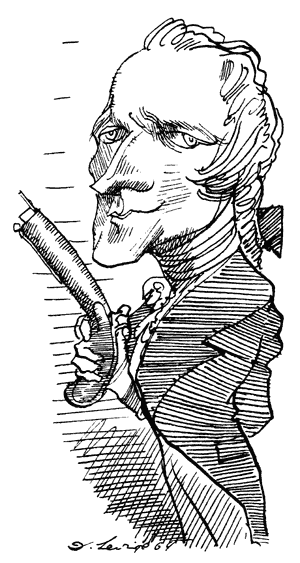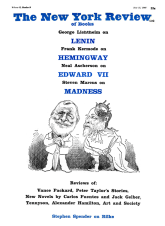If it is true that one can learn much about a people by its choice of heroes, then a study of Alexander Hamilton and his reputation among Americans during his lifetime and thereafter should be instructive. Hamilton served with distinction in the Continental Army throughout the Revolution. He was a leader in the movement which resulted in the Philadelphia Convention, and though he had little influence over the shaping of the Constitution and did not greatly admire it, he campaigned vigorously and effectively for its ratification. As Washington’s Secretary of the Treasury, he was brilliantly successful in establishing the nation’s finances on a sound basis, and his advice to the President in other areas of government was also considerable. He was the first American to visualize the tremendous industrial potential of the country, and to advocate government assistance and planning as a means of realizing it. This record would seem to be quite sufficient to establish him firmly and unambiguously among the leading ranks of Founding Fathers. He is there all right, but not unambiguously. The fact is that Hamilton makes a very awkward ancestor. He was associated with monarchical, aristocratic, and anti-republican ideas during his life-time, and rightly or wrongly, his posthumous reputation has never quite escaped these associations. He was and has remained the personification of opposition to Thomas Jefferson, and in so far as Jefferson has been revered, the natural tendency has been to distrust and condemn Hamilton. Yet Hamilton’s contributions to the new nation were great, and the belief that he has been misunderstood and unappreciated has periodically inspired attempts to win for him some measure of the gratitude and glory he craved in life, and which, it is felt, he most assuredly earned. Mr. Rossiter’s book is the latest of such attempts. He argues that Hamilton was a first-rate political thinker, a great constitutionalist, and a truly great and wholly patriotic American. The last two of these three claims are aimed particularly, it would seem, at the profound yet not always precisely defined conviction of many people that Hamilton, though he served his country well, was not really committed to its fundamental principles.
The first of these principles was and has been a deep and pervasive belief in constitutional government. No other principle—not liberty and not equality—has endured so universally and for so long a time as the touchstone of political legitimacy. It is therefore necessary to examine Mr. Rossiter’s interpretation of Hamilton as a great constitutionalist with careful attention.
He describes Hamilton as “the most influential constitutionalist of his age,” and states that his was “the most splendid service rendered to the Constitution by any man of the first generation of free Americans.” In order to substantiate these assertions, Mr. Rossiter notes Hamilton’s various contributions up to 1789, but relies primarily, if I understand him correctly, on the interpretations of the Constitution which he worked out as Secretary of the Treasury. Hamilton, says Mr. Rossiter, thought that “the Constitution was more properly viewed as a grant of powers than a catalogue of limitations,” and initiated what has come to be known as the theory of broad or loose construction of the Constitution. This theory was dominant during the first twelve years of the new government’s existence, and the Constitution which Jefferson inherited in 1801 was the document of 1787 plus the Hamiltonian gloss of the 1790s—a gloss which has never been eradicated. The conflict between the Hamiltonian and Jeffersonian canons of interpretation continued for another century and a third, and it was eventually the former which emerged victorious. Thus, as Mr. Rossiter would say, the Constitution of 1964 is a Hamiltonian constitution. Hamilton might not approve of the specific purpose or content of the proposal for national regulation of Mrs. Murphy’s boarding house, but he would rejoice in the interpretation of the powers of Congress which is said to justify it constitutionally.
Indeed, there appears to be some reason to believe that Hamilton would think the long debate over the powers of the national government, from 1776 to the present, silly and superfluous. Mr. Rossiter quotes Hamilton as believing that the nation had “full power of sovereignity” from the moment of independence, and that the Articles of Confederation was in fact “an abridgement [of] the original sovereignty of the Union.” And, “Why may not the United States, constitutionally, employ the means, usual in other countries, for attaining the ends intrusted to them?”
It is regrettable that Mr. Rossiter did not explore the significance of these statements more fully. Their assumptions and implications are revealing, and although it is possible to read into them more than was intended, they should be analyzed in some depth. If Hamilton thought the Union existed from the moment of independence, and that the Articles of Confederation was an abridgment of its sovereignty, then his political thought was indeed far removed from that of his contemporaries. It was alien to the highly legalistic strain in American colonial and early republican thought, and to the tendency of Americans to interpret the consent which they believed necessary for a legitimate government to involve in the beginning at least, a rather formal act. Certainly there would seem to be some awkwardness in reconciling Hamilton’s conception of the original, inherent, and full sovereignty of the Union with the American conception of federalism. And finally, if Hamilton believed the Articles of Confederation to be an abridgment of the nation’s sovereignty, then logically he must have thought the same about the Constitution of 1787. Did he, then, think that Constitution was “unconstitutional?” And if he did, then just what manner of “constitutionalist” was he? For that matter, how would one fit his theory of judicial review into this apparent theory that no written constitution was necessary to establish the Union? It would seem that much remains obscure as to the nature of Hamilton’s theory of constitutionalism. I am reluctant to accept Mr. Rossiter’s estimate of him as the greatest constitutionalist of his age until this obscurity has been resolved.
Advertisement
There are also other reasons, more obvious ones involving a comparison between Hamilton’s contributions and those of other men. How, for example, is one to weigh Hamilton’s advocacy of broad construction, together with its immediate achievements and its long-range influence, against Madison’s advocacy of a Bill of Rights, together with its immediate success and its long range influence? One may also speculate as to the respective influences of the loose and strict construction theories of interpretation. If the former had not been constantly opposed by the latter for nearly a century and a half of our experience under this Constitution, what would the results have been? To measure Hamilton’s influence adequately requires far more than the simple finding that his theory is dominant today, for “today” is very much the product of the past, and much of the past was dominated by the idea that the Constitution was to be read primarily as a system of limitations, not, as Mr. Rossiter says Hamilton would have it, as a grant of powers. One factor to be considered is what might be called the myth of the Constitution and its role in American politics. The structure and functions of the myth are too complex to treat thoroughly in a short review, but its significance can be suggested by the very different practical results which have stemmed from the respective acceptance and rejection by various communities in the South of the Supreme Court’s 1954 decision that public schools racially segregated by state law were unconstitutional. The Constitution has served as a unifying and stabilizing element in American politics, and it has done so partly because there has been a pervasive and lingering tendency to believe that it somehow represents an objective fundamental law. Would such a belief have survived had Hamilton’s theory of loose construction not been persistently opposed? Such questions must be explored before Hamilton or any other man can be judged the greatest or most influential constitutionalist of his age.
This much can be said, I think. If Hamilton was a great constitutionalist, his was of a kind not altogether congenial with the main strain of American constitutionalism prior to the early 1930s. That was a strain which consistently stressed the limitations of government, closely associating limited government with the existence of individual liberty and happiness. (Like Hamilton, George III would doubtless have been pleased to regard his constitution as a grant of powers rather than a list of limitations.) In this century, we have come to a realization that these ends may require extensive exercise of governmental power. Hamilton’s recognition that such power is not always to be feared, that it may be used beneficently as well as abused oppressively, is certainly relevant for our times, and is one of the strongest elements in Mr. Rossiter’s presentation. Yet there still remains a reservation to be overcome before admitting Hamilton to the ranks of revered as well as respected Founding Fathers. What did Hamilton want to use the power of the national government for?
Mr. Rossiter struggles nobly with this question, and attempts to construct a picture of Hamilton’s “good society” which will somehow make one forget his enthusiasm for child labor as revealed in the Report on Manufactures. But what comes out, in the end, is Hamilton’s ardent nationalism. Mr. Rossiter describes him, presumably not altogether seriously, as “the one ‘full-blooded American’ alive in the early years of the Republic.” By this Mr. Rossiter means that while practically all of his contemporaries divided their loyalty between their separate states and the new national union, Hamilton was exclusively devoted to the latter. It was believed at the time that he would have been very happy to eliminate the states as anything more than convenient administrative units, and the evidence seems to support this belief. Mr. Rossiter knows, as Hamilton knew, that this was one of the things that set him apart from his fellow Americans. So did the content and spirit of his nationalism. As Mr Rossiter says, “He wanted to be, and thought every man of sense would want to be, a citizen of a great community, a nation raised to power and glory.” Well: there were plenty of Americans, men of sense or not, who wanted only to be happy and free. (And I suspect there are plenty of political scientists who would regard Hamilton’s notion as of dubious value in the quest for international order and stability.) The United States has, in fact, become a nation of power and perhaps of glory as well, but it was not because of conscious pursuit of these goals. Even today this kind of nationalism is not particularly congenial to many Americans, and this may be one of the reasons we feel exasperated at the recent antics of Charles de Gaulle. It is not so much that he has challenged our international leadership, a leadership still accepted with a certain amount of reluctance, but that he gives the impression of playing a game which is alien to us, and which we would be too embarrassed to play—at leas’ so blatantly. Alexander Hamilton would have understood the General very well indeed, for they are of the same brotherhood in spirit.
Advertisement
But we were not a Gaullist people in the last quarter of the eighteenth century, nor are we now And here, I think, we come back to the perennial problem of Hamilton’s rank and place among the roll of American heroes. In spite of Mr. Rossiter’s urbanely passionate pleading, we have to leave Hamilton just where he was before—in a position of permanent ambiguity. His contributions to the Constitution and to the nation were great, as is generally recognized, but as he recognized, he was not truly one of us. After all, what would we have done all these years with a Declaration of Independence which listed the inalienable rights as “Life, Liberty, and the Pursuit of Glory”?
This Issue
June 11, 1964




